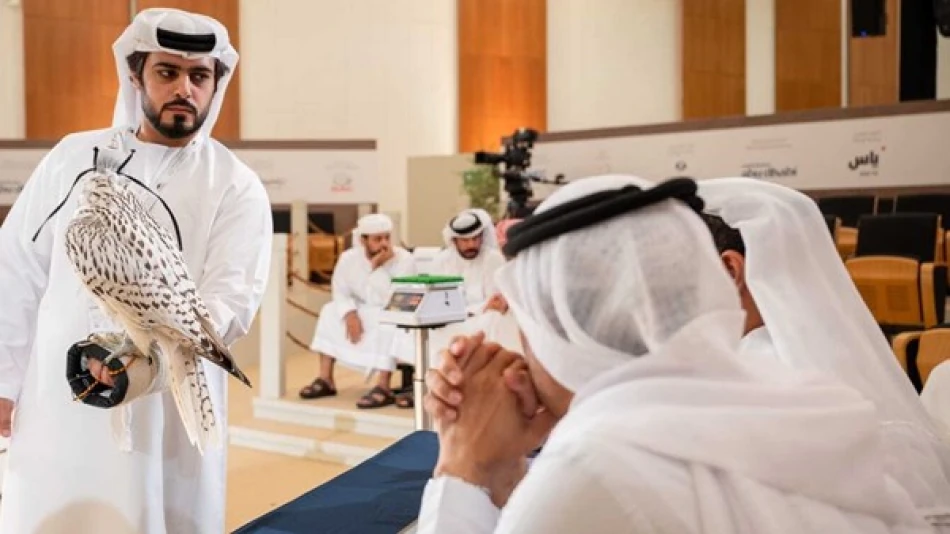
Unveiling Abu Dhabi's Captivating Heritage at the International Hunting and Equestrian Exhibition
Abu Dhabi's Hunting and Equestrian Expo Reinforces UAE's Cultural Heritage Leadership
The 22nd Abu Dhabi International Hunting and Equestrian Exhibition demonstrated how the UAE continues to leverage traditional practices to strengthen its position as a global cultural hub. Friday's events showcased not just ancient hunting and equestrian traditions, but also how these heritage industries drive modern economic activity through international competitions, auctions, and knowledge transfer.
Falcon Competition Highlights UAE's Dominance in Traditional Hunting Sports
The falcon beauty contest emerged as the exhibition's centerpiece, featuring 15 birds competing across three prestigious categories: Hur, Qarmousha, and Gyr Pure. The competition attracted both national and international breeding farms, underscoring the global appeal of Middle Eastern falconry traditions.
Al-Azba Al-Dahabi Farm dominated the results, sweeping the top three positions in the Gyr Pure category while securing first and third place in the Qarmousha division. Al-Dhafra Falcon Farm claimed second place in the Qarmousha category, demonstrating the high caliber of UAE-based breeding operations.
Strategic Cultural Investment Pays Dividends
This competition represents more than ceremonial tradition—it's a calculated effort to cement Abu Dhabi's international standing in falconry. The UAE has systematically invested in preserving and promoting falconry culture, recognizing its potential to attract tourism, foster international relationships, and maintain cultural identity in a rapidly modernizing nation.
Arabian Horse Auction Draws Global Elite
The Arabian horse auction, organized in partnership with the Emirates Arabian Horse Society, attracted premium breeders, owners, and enthusiasts from worldwide markets. The intense bidding competition reflected the continued strength of the purebred Arabian horse market, which has historically served as both a luxury asset class and cultural symbol.
This mirrors similar high-value heritage asset markets in other Gulf states, where traditional breeding programs have evolved into sophisticated international businesses worth millions of dollars annually.
Knowledge Platform Bridges Tradition and Modernity
The exhibition's knowledge platform demonstrated how traditional practices can address contemporary challenges. Abu Dhabi Police's "Black Spots" workshop exemplified this approach, using the exhibition venue to discuss traffic safety solutions in urban areas—showing how cultural events can serve broader public policy objectives.
Educational Programming Ensures Cultural Continuity
Specialized sessions covered crucial practical knowledge, from falcon identification and training techniques to emergency veterinary care for horses and camels. The "Know Your Falcons" activity and expert panels on equine health and nutrition provided visitors with actionable insights while preserving traditional knowledge systems.
Ali Al-Ameri's interactive session on "The Art of Horse Communication" particularly highlighted how traditional skills remain relevant in modern equestrian practices, attracting both heritage enthusiasts and professional horse handlers.
International Cultural Exchange Through Traditional Hunting
The Mongolian eagle hunting demonstration provided visitors with comparative perspectives on hunting traditions across cultures. By showcasing Asian hunting practices alongside Arabian Saluki dog exhibitions, the event positioned Abu Dhabi as a global center for traditional hunting culture rather than merely a regional hub.
This international programming strategy reflects the UAE's broader diplomatic approach of using cultural soft power to build international relationships and attract diverse visitor demographics to the Emirates.
Commercial Success Validates Heritage Tourism Strategy
Strong visitor turnout at exhibitor booths—both local and international—confirmed the commercial viability of heritage-focused events. Equipment vendors reported robust sales of camping and hunting gear, indicating that traditional activities continue generating substantial economic activity.
This success validates the UAE's strategy of investing in heritage tourism and cultural events as economic diversification tools, particularly as the region seeks to reduce dependence on oil revenues while maintaining cultural authenticity.
Most Viewed News

 Layla Al Mansoori
Layla Al Mansoori






